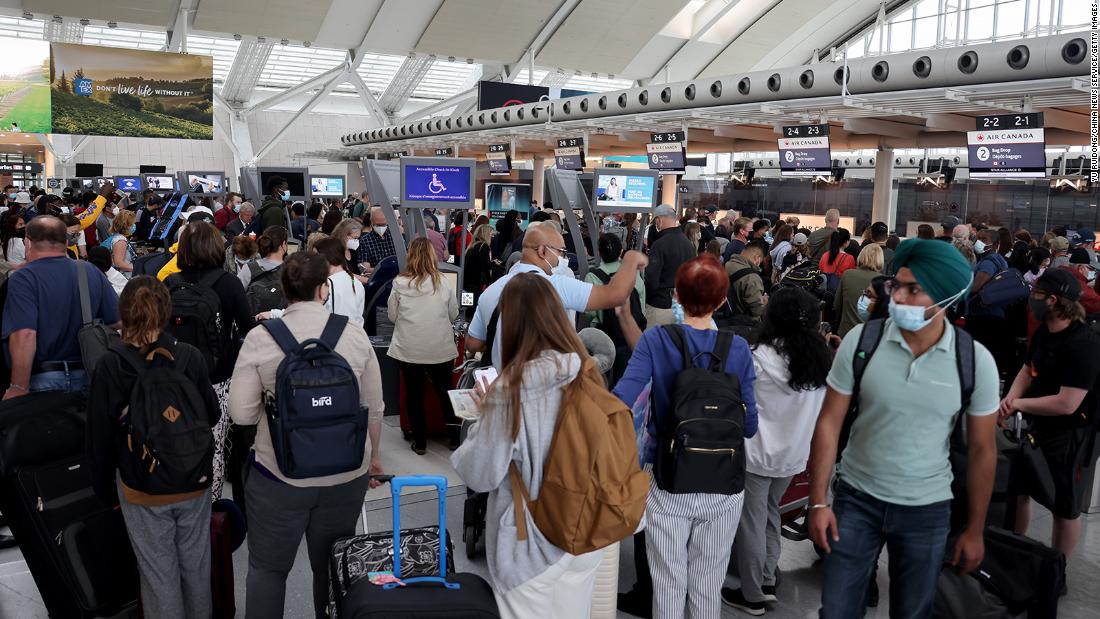
(CNN) — Anyone who’s been to an airport recently can see that demand for travel is back in a big way. What’s not back with a vengeance are the resources needed to handle the crush of air travelers.
Add summer weather to staffing issues at airports and airlines and you have a perfect storm of delays and cancellations.
A whopping 52.5% of the airport’s scheduled flights have been delayed this summer, the data shows. Toronto Pearson also ranks No. 4 for flight cancellations globally, with 6.5% of its flights canceled during that period.
The policy allows travelers to change their departing or arriving flights to Billy Bishop Toronto City Airport or to extend connection times at Toronto Pearson.

Travelers line up at Toronto Pearson International Airport on June 30, 2022. More than half of the airport’s recent flights have been delayed.
Yu Ruidong/China News Service/Getty Images
Europe is also plagued with delays
Of course, Toronto’s airport is far from alone in struggling with disruptions.
Seven of the world’s top 10 airports for delays this summer, ranked by the percentage of scheduled flights delayed, are in Europe. Airports in Frankfurt, Paris, Amsterdam and London are seeing the most significant delays, according to FlightAware data.
US Transportation Secretary Pete Buttigieg recently told CNN that he’s seeing air travel improvements, but he still expects airlines to do better.
“Look, we are counting on airlines to deliver for passengers and to be able to service the tickets that they sell,” Buttigieg said.
Global airports with the most summer delays
Here are the top 10 world airports for delays this summer with percentages of flights delayed:
1. Toronto Pearson International Airport (Canada): 52.5%
2. Frankfurt Airport (Germany): 45.4%
3. Paris Charles de Gaulle Airport (France): 43.2%
4. Amsterdam Airport Schiphol (Netherlands): 41.5%
5. London Gatwick Airport (United Kingdom): 41.1%
6. Heathrow Airport (United Kingdom): 40.5%
7. Munich Airport (Germany): 40.4%
8. Athens International Airport (Greece): 37.9%
9. Sydney Kingsford Smith Airport (Australia): 34.2%
10. Orlando International Airport (United States): 33.4%
Rankings are from FlightAware data from May 26 to July 19.
Global airports with the most summer cancellations
Shenzhen Bao’an International Airport in China’s Guangdong Province is the world’s No. 1 for cancellations this summer, with nearly 8% of flights canceled, according to FlightAware data. China’s Guangzhou Baiyun International Airport and Chongqing Jiangbei International Airport also rank in the top 10.

Shenzhen Bao’an International Airport in China’s Guangdong Province has seen more cancellations than any other airport in the world since late May, according to FlightAware data.
Liang Xu/Xinhua News Agency/Getty Images
And during China’s Labor Day holiday in May, domestic trips were down by a third from the same period last year, according to the Ministry of Culture and Tourism.
Three US airports also rank in the top 10 in terms of the percentage of scheduled flights canceled, with New York-area airports Newark and LaGuardia at Nos. 2 and 3 and Washington’s National Airport at No. 8.
Looking into the global top 20, the airports in Boston (No. 12), Charlotte (No. 13), Philadelphia (No. 14) and Miami (No. 16) all make the cancellations list, as well as John F. Kennedy International Airport in New York (No. 15) and Chicago’s O’Hare International Airport (No. 19).
While Europe dominated the global list for delays, only one European airport — Amsterdam Schiphol — appears in the top 10 for cancellations from May 26 to July 19. Australia and Indonesia also have one entry each in the top 10 for cancellations.

Travelers line up to check in at Newark Liberty International Airport on July 1. Newark is the world’s No. 2 airport for cancellations this summer.
Jeenah Moon/Getty Images
Here are the top 10 world airports for cancellations this summer with percentages of flights canceled:
1. Shenzhen Bao’an International Airport (China): 7.9%
2. Newark Liberty International Airport (US): 7.4%
3. LaGuardia Airport (US): 7%
4. Toronto Pearson International Airport (Canada): 6.5%
5. Soekarno–Hatta International Airport (Indonesia): 6.2%
6. Sydney Kingsford Smith Airport (Australia): 5.9%
7. Guangzhou Baiyun International Airport (China): 5.2%
8. Ronald Reagan Washington National Airport (US): 5%
9. Chongqing Jiangbei International Airport (China): 4.6%
10. Amsterdam Airport Schiphol (Netherlands): 3.9%
Correction: A previous version of this story mentioned “delays” where it should have said “cancellations” pertaining to Amsterdam Schiphol Airport and airports in Australia and Indonesia.
CNN’s Nectar Gan, Pete Muntean and Gregory Wallace contributed to this report.